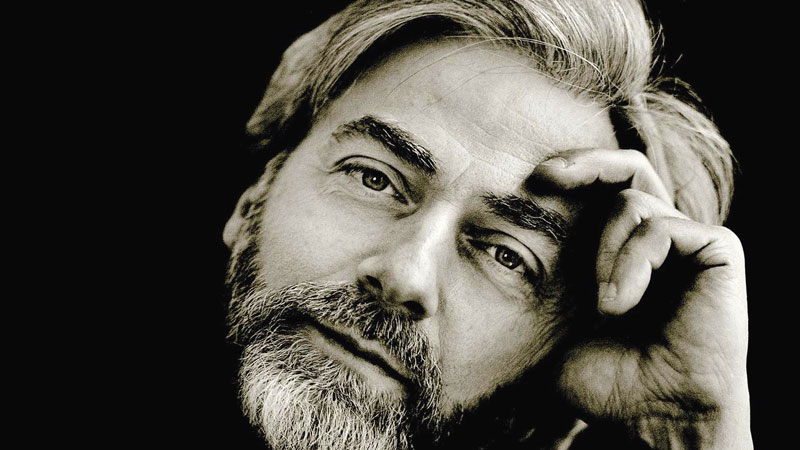léonie sonning music prize 1994
The Polish pianist Krystian Zimerman received the Léonie Sonning Music Prize of 250,000 Danish kroner at a concert on 27 May 1994 at the Tivoli Concert Hall.
The prize was presented by Amalie Malling, a member of the Léonie Sonning Music Foundation’s board. In her prize speech she highlighted both Zimerman’s work as a pianist and his humanistic approach to the world and to music. She praised the spiritual contact that Zimerman is always able to create with his audience, and his principle of giving himself time, manifested in the fact that he gives only around 15 concerts a year.
citation
The Léonie Sonning Music Prize is awarded to Krystian Zimerman, who since his international breakthrough in 1975 has been one of the great pianists of his generation. With his distinguished sense of sound and form and penetrating seriousness, Zimerman lets the classical piano repertoire appear in a new light, while his persistent musical curiosity constantly leads him towards a new and unknown repertoire.
The programme
JS Bach (arr. Zimerman) Passacaglia and Fugue in C minor BWV582
Schubert Seven Easy Variations, D.Anh.1/2
Mendelssohn Variations Sérieuses, Op 54
Ravel Valses nobles et sentimentales
Webern Variations, Op 27
Szymanowski Variations on a Polish Folk Melody, Op10
Andrzej Jasinski Mazurka (encore)
Chopin Waltz (encore)
Krystian Zimerman in Denmark
In 1983, Krystian Zimerman gave his first concert in Denmark, as a soloist in Brahms’s Piano Concerto No 1 with the Danish National Symphony Orchestra. In the 1980s he gave several performances at the Tivoli Concert Hall, both recitals and concerto appearances. In 1989 he performed Beethoven’s five piano concertos at Tivoli and in 1993, Bartók’s Piano Concerto No 1. Over the years, Tivoli became so important to Zimerman that he chose the hall to record an album of works by Liszt, released by Deutsche Grammophon in 1991.
On 28-29 May 1994, Krystian Zimerman held a master-class for six piano students at the Royal Danish Academy of Music in Copenhagen: Marie Rørbech, Christina Bjørkøe, Nikolaj Koppel, Isabel Carlander, Francisca Skoogh and Jonas Kornbeck. They worked on a wide range of works from Haydn to Schumann and Bartók. Footage from the master class was shown in the documentary portrait of Zimerman broadcast by the Danish Broadcasting Corporation on 12 June.
The daily press wrote, among other things:
What is so special about Zimerman? The ability to establish personal emotional contact with the audience was of real importance here. But the starting point for this contact is the interpretation of the work. With Zimerman, it is always received as a gift. Logic carries the musical idea, but he is also an instrumentalist through and through. It is as if he is constantly making demands of the piano and wresting new colours and expressions from it. He has a lavish range of touches. He extends the concept of precision to include the weight of the note, the resilience of the sound, the dynamic strength and nuance of the tone colour. He gives voice to works of fantasy that cry with seduction.
(Teresa Waskowska, Politiken, 27 May 1994)
The 38-year-old Pole is the youngest recipient of an award that usually goes to musicians who have come to define their generation. If Zimerman is hardly that yet, then at least he is more than just another excellent pianist. He is an exceptional artist who invests strong, personal attitudes in his playing. He is a direct, clear-minded and deeply serious musician who never touches a key before thinking about it. […]. After pianistic perfection, clarity and a sense of sound, Zimerman’s most striking characteristics are his endearing seriousness, his incorruptible inner logic and his willingness to look for the emotional heart of organic forms and structures. His sense of form and overview are second to none and make for a vivid experience.
(Jan Jacoby, Politiken, 29 May 1994)
With Mendelssohn’s “Variations Serieuses” the Polish pianist Krystian Zimerman provided the reason why he deserved to be presented with the 1994 Sonning Prize. Here his mastery was clear: his union of musical intelligence and ardent emotion lifted Mendelssohn’s synthesis of Romantic expression with Baroque forms into a personal message that unfolded in richly nuanced timbres, held fast in its distinct layers of sound, tense against each other, in a rigorous unfolding whereby virtuosity was just another surplus.
(Peter Woetmann Christoffersen, Berlingske Tidende, 29 May 1994)





